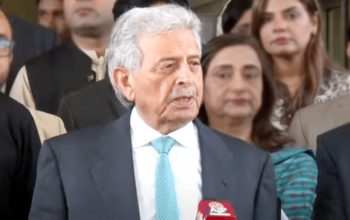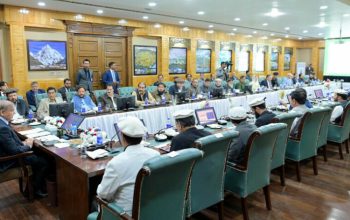The apex court resumed hearing on Wednesday a set of petitions challenging the Supreme Court (Practice & Procedure) Act 2023, with the aim to conclude the case today.
Questions have been raised on Parliament's competence to regulate the administrative workings of the Supreme Court (SC) as well as transparency in the internal workings of the judiciary during past hearings. Moreover, whether the law is taking away the CJP's powers or the apex court's has been debated extensively during proceedings.
The law in question, passed by Parliament in April 2023, regulates discretionary powers of the chief justice of Pakistan (CJP) by requiring a committee of three senior judges of the apex court, including the CJP, to form benches for constitutional matters of public importance and taking suo motu notice.
A full court led by CJP Qazi Faez Isa and comprising Justice Sardar Tariq Masood, Justice Ijazul Ahsan, Justice Mansoor Ali Shah, Justice Munib Akhtar, Justice Yahya Afridi, Justice Aminuddin Khan, Justice Mazahar Ali Akbar Naqvi, Justice Jamal Mandokhail, Justice Muhammad Ali Mazhar, Justice Ayesha Malik, Justice Athar Minallah, Justice Syed Hasan Azhar Rizvi, Justice Shahid Waheed and Justice Musarrat Hilali, has taken up nine review petitions against the 2023 Act.
The petitioners view the law as an attempt to clip the powers of the CJP and pave the way for Parliament to interfere in the inner workings of the apex court.
Today (Wednesday) is the fourth hearing on the matter, which has been live telecasted since the proceedings began.
The court intended to conclude the case yesterday (Tuesday) but the hearing was adjourned due to time constraints.
The attorney general of Pakistan (AGP) and the Pakistan Bar Council are due to present arguments today while the Muttahida Qaumi Movement-Pakistan's counsel completed arguments at the previous hearing.
On Monday's hearing, the CJP observed that Parliament must not be prevented from doing good even if it lacks two-third majority.
Read Regulating CJ’s powers: Will SC finally accept parliament’s competence?
At yesterday's hearing, he observed that all institutions must hold themselves accountable. The matter of the judiciary's contentions under past dictatorships and democratic governments have also been called into question during proceedings.
CJP Isa has stressed on expediting the proceedings for the past three hearings noting that prolonged cases reflect poorly on the court's performance.
Previous hearings
During yesterday's hearing, CJP Isa called into question the process of a full court and what happens if the top judge refuses to convene one. "If I don't call a full court meeting, can a writ petition be filed against me? What if 14 judges want to call a full court meeting and I don't want to?” he asked.
When Justice Munib referenced the US Supreme Court on one occasion, the CJP pointed out that it did not contend with the staggering burden of 56,000 pending cases, as is the situation in Pakistan.
He further noted that the US Supreme Court typically hears approximately 120 cases annually, a stark contrast to Pakistan, where nearly every legal matter finds its way to the highest court.
Meanwhile, Justice Ayesha Malik asked if the full court continued to hear the case, who would hear the appeal against its verdict?
To this, MQM-P's counsel Faisal Siddiqui replied that even if the number of judges reached 50, an appeal against the decision of the full court cannot be heard.
Read more CJP Isa seeks input on judges’ appointment criteria
The CJP observed that a law cannot be declared invalid because there was no right of appeal against the decision of the full court.
Justice Mussarat Hilali noted that the SC had shaken the foundations of the country by using Article 184(3).
She told the MQM-P lawyer that the Constitution was drafted in 1973 and the rules were prepared in 1980. “You don't think there is a need for improvement?” she asked him.
The day prior, on Monday, while presenting arguments in his individual capacity, Dr Adnan Khan had said that the office of the chief justice had been rendered redundant through the Act. Under the Constitution, the chief justice was in the driving seat in administrative matters.
PML-Q lawyer Zahid Ibrahim, while arguing in favour of the legislation, had said that the constitutional powers of this court had not been reduced under the Act. He added that the petitioners, who had challenged the legislation, had not said anything as to which fundamental right was affected by the Act.
Meanwhile, PML-N lawyer Barrister Salahuddin had said that several chief justices and judges had shown reservations to the use of the Article 184(3) of the Constitution, adding that the PBC had been demanding for 10 years to regulate the powers of the chief justice.
Read the full story at the express tribune website.


